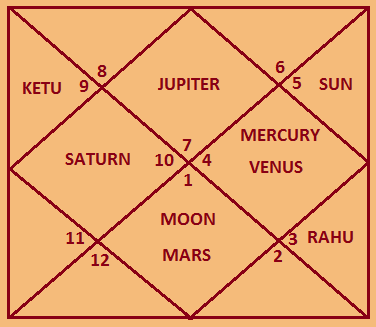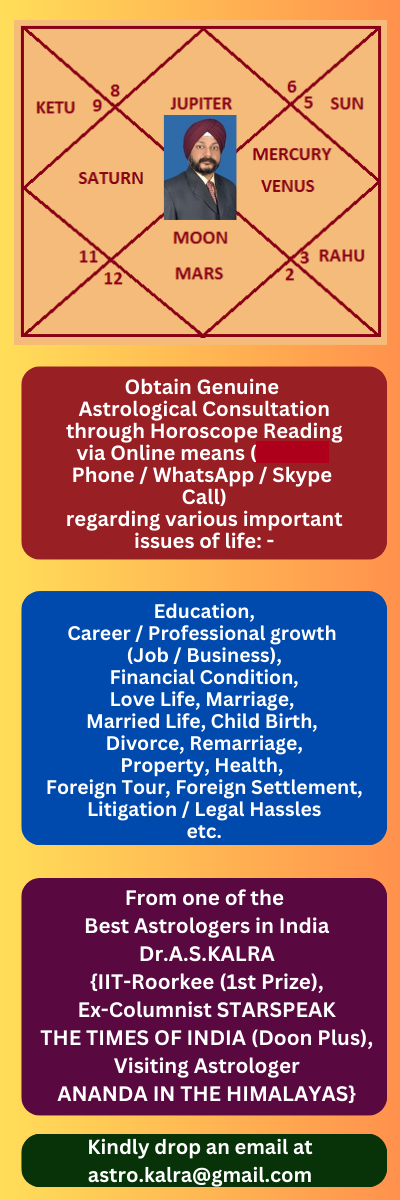Working principle of Astrology



Working Principle of Vedic Astrology
By: - Dr.A.S.Kalra Astrologer
Working Principle of Indian Vedic Astrology: -
The celestial bodies in the sky, including planets, continuously revolve around the Sun, acquiring different positions during their movement. Thousands of years ago, Indian sages discovered through their intuition a relationship between the planetary positions at the time of a person's birth and the various events and personality traits in their life. This forms the basis of Indian Vedic Astrology, known as "Jyotish" in Hindi, derived from the word "Jyoti" meaning light. Jyotish sheds light on a person's life.Astrology holds significance in the Vedas and is considered an eye in Vedic literature. The primary objective of the Vedas is to attain a connection with the divine and alleviate the problems of life. Time is fundamental in Indian Astrology, and the movement of celestial bodies helps determine it. Stars, constellations, and planets are the celestial bodies considered in Vedic Astrology. The subject showcases the remarkable talents of our Indian sages or Rishis. They arrived at conclusions that align with what modern scientists have discovered today, using complicated calculations and advanced scientific instruments. However, our ancient sages relied on their intuition to arrive at those conclusions when such resources were not available. While there may be debates about predictive Astrology, the calculation part of Vedic Astrology, which is based on astronomy, is considered a pure science.
The mathematical formulas derived by ingenious Indians thousands of years ago still hold true today. For instance, dividing the sky into 27 constellations and 12 zodiac signs, determining the relative speeds between planets, their satellites, and constellations, and accurately predicting their positions in the sky in advance. They also calculated the angular velocities of celestial bodies, divided the sky into 360°, developed the concept of degrees, minutes, and seconds for precise angle measurements, and made advanced calculations regarding solar and lunar eclipses long ago.
The nomenclature of the ascending and descending nodes of the Sun and Moon as Rahu and Ketu, respectively, is still valid today. This nomenclature is crucial for the advanced calculation of eclipses. Modern science took a considerable amount of time to arrive at the understanding that there is a strong interconnection among celestial bodies and that the entire universe functions as a unified system. However, the science of Astrology has been based on this assumption for thousands of years.
The principles or basis of Vedic astrology are rooted in ancient Indian scriptures known as the Vedas. Vedic astrology, also known as Jyotish, is a holistic system that seeks to understand the interconnectedness between the celestial bodies and human life on Earth. Here are some key principles and foundations of Vedic astrology:
(1) Karma and Destiny: Vedic astrology believes in the concept of karma, which suggests that our actions in past lives and the present influence our destiny. The planetary positions at the time of birth are believed to reflect the fruits of past actions and provide insights into future experiences.
(2) Planetary Influences: Vedic astrology considers the influence of nine celestial bodies or grahas, including the Sun, Moon, Mars, Mercury, Jupiter, Venus, Saturn, Rahu (North Lunar Node), and Ketu (South Lunar Node). Each planet is associated with specific qualities and has its own significance in a person's chart.
(3) Birth Chart or Horoscope: The birth chart, also known as the horoscope or Kundli, is the cornerstone of Vedic astrology. It is calculated based on the precise date, time, and place of birth. The chart is divided into twelve houses, each representing different areas of life, such as personality, career, relationships, and spirituality.
(4) Dashas and Transits: Vedic astrology utilizes the concept of planetary periods known as Dashas to assess the timing and unfolding of events in a person's life. These periods are determined by the position of the Moon at the time of birth. Additionally, the transits of planets through different signs and houses are considered to provide further insights into specific time periods.
(5) Remedies and Muhurta: Vedic astrology offers remedies and guidance to mitigate the challenging planetary influences and enhance the positive aspects in one's life. These remedies can include wearing gemstones, performing specific rituals, reciting mantras, or engaging in acts of charity. Muhurta, the selection of auspicious timings for important events, is also an integral part of Vedic astrology.
It's important to note that Vedic astrology is a complex and intricate system with a rich philosophical background. It combines mathematical calculations, astronomical observations, and intuitive interpretations to provide insights into various aspects of life. The accuracy and effectiveness of Vedic astrology depend on the astrologer's expertise, knowledge, and understanding of the principles, as well as the quality of birth data provided.
